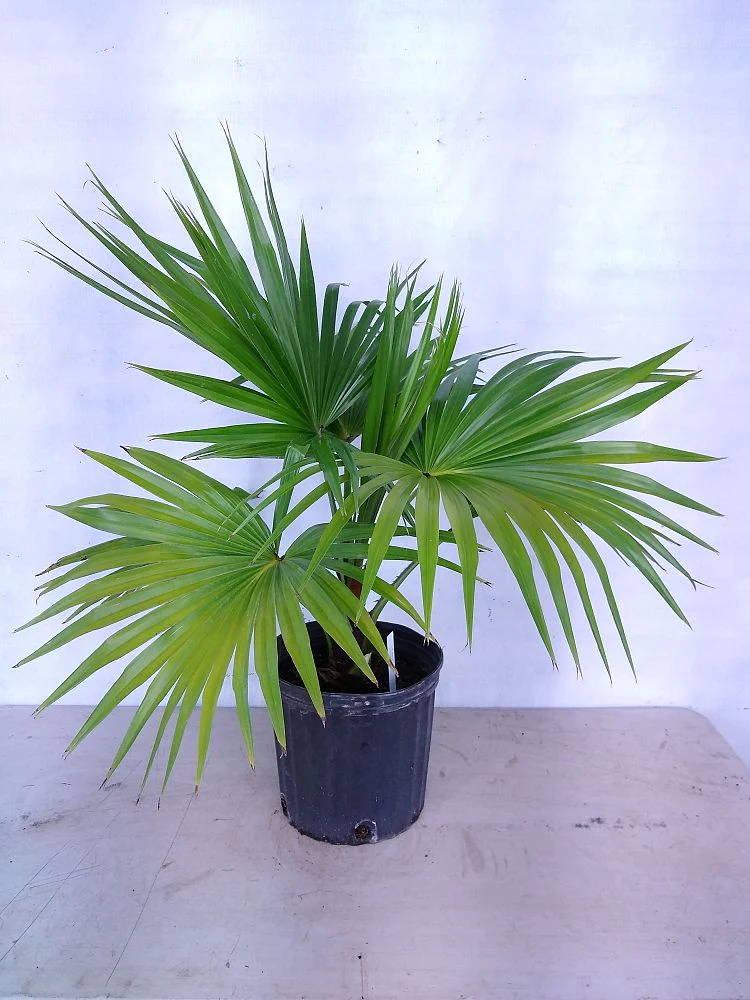Fan Palm (Livistona chinensis)
Original price was: ₹299.00.₹249.00Current price is: ₹249.00.
OVERVIEW
Fan Palm (Livistona chinensis)
Local Indian Name: Chinese Fan Palm
Scientific Name: Livistona chinensis
Family: Arecaceae (Palm Family)
Category and Subcategory: Ornamental Evergreen Palm
Native Region: Southern Japan, Taiwan, and Southeastern China
Introduction:
The Chinese Fan Palm (Livistona chinensis) is an elegant, slow-growing palm known for its distinct fan-shaped leaves. It is widely cultivated for ornamental purposes in tropical and subtropical regions, making it a popular choice for gardens, parks, and landscapes.
Importance & Benefits:
-
Aesthetic Appeal: Its large, drooping fan-like leaves add a tropical look to landscapes.
-
Air Purification: Improves air quality by filtering pollutants.
-
Drought Resistance: Can tolerate dry conditions once established.
-
Soil Erosion Control: Helps stabilize soil with its deep-root system.
Description and Cultivation:
Livistona chinensis is a slow-growing, single-trunk palm that can reach up to 9-15 meters in height. Its broad, fan-shaped leaves can grow up to 6 feet in diameter, with gracefully arching leaf tips. Small yellowish flowers bloom in clusters, followed by blue-green fruits.
Varieties and Cultivars:
-
Livistona chinensis var. subglobosa: A dwarf variety suitable for smaller spaces.
-
Hybrid Variants: Developed for enhanced resilience and adaptability.
Location and Light:
-
Sunlight: Prefers full sun but can tolerate partial shade, especially when young.
-
Climate: Thrives in warm, humid conditions and is adaptable to subtropical climates.
Soil Preparation:
-
Prefers well-drained, loamy, or sandy soil with a pH range of 6.0–7.5.
-
Organic compost enhances soil fertility and root development.
Planting:
-
Ideal planting time: Spring or early monsoon season.
-
Requires spacing of 10-12 feet to accommodate mature growth.
-
Plant at the same depth as in the nursery, ensuring proper root establishment.
Watering:
-
Water regularly during the initial growth phase.
-
Once established, the plant becomes moderately drought-resistant.
Pruning:
-
Trim dead or damaged leaves to maintain a healthy appearance.
-
Avoid over-pruning, as it may weaken the plant’s natural structure.
Pest and Disease Management:
-
Common Pests: Scale insects, spider mites, and aphids.
-
Diseases: Root rot (due to overwatering) and leaf spot diseases.
-
Control Measures: Use neem oil or organic pesticides for pest control, and ensure proper drainage to prevent fungal infections.
Environmental Conditions:
-
Temperature: Best suited for 20°C–35°C; tolerates mild frost.
-
Humidity: Prefers moderate to high humidity levels.
-
Wind Resistance: Can withstand strong winds when mature.
Propagation:
-
Propagated mainly through seeds, which take several weeks to germinate.
-
Requires warm, moist soil for successful seedling growth.
Uses:
-
Landscaping: Ideal for home gardens, parks, and public spaces.
-
Indoor & Container Planting: Can be grown in large pots with sufficient sunlight.
-
Cultural & Decorative Use: Sometimes used in traditional events and ornamental displays.
Monetary Benefits:
-
High Demand: Popular in nurseries for landscaping projects.
-
Commercial Sale: Generates income through ornamental plant sales.
-
Long-Term Investment: Low maintenance and long lifespan make it a valuable addition to gardens and urban landscapes.
References:
RELATED PRODUCTS
REVIEWS





Reviews
There are no reviews yet.